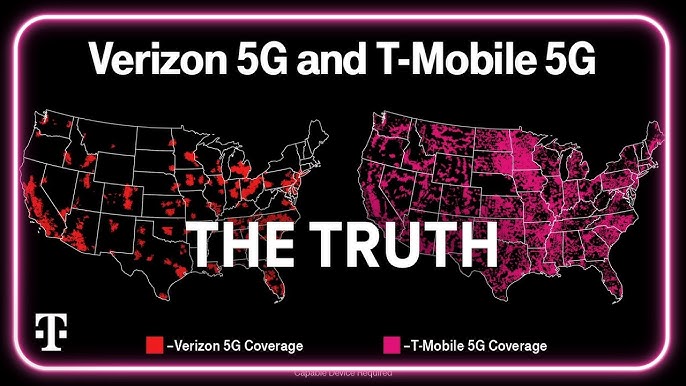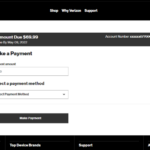When choosing a mobile carrier in the US, network coverage is often the deciding factor. You need a reliable signal where you live, work, and travel. T-Mobile and Verizon are two of the nation’s largest providers, both offering extensive networks, but their coverage strengths differ, particularly when comparing 4G LTE reach and the rollout of various 5G technologies. Examining the t mobile coverage vs verizon landscape helps you determine which might serve you better.

4G LTE Coverage: The Foundation
Before 5G became widespread, 4G LTE was the standard, and both carriers built formidable networks.
Verizon’s Strength: Reliability and Reach
Verizon has long been recognized for its vast and reliable 4G LTE network. It consistently ranks highly for covering a very large percentage of the US population, often earning a reputation as the go-to carrier for dependable coverage, especially in many rural and remote areas. If consistent 4G LTE signal across diverse geography is your top priority, Verizon’s network has historically been a benchmark.
Read more about: verizon customer service billing
T-Mobile’s Progress
T-Mobile also operates a substantial nationwide 4G LTE network. While historically considered slightly behind Verizon in terms of sheer geographic reach, particularly in deep rural zones, T-Mobile’s 4G LTE coverage is extensive and serves the vast majority of Americans effectively, especially in populated areas.
The 5G Frontier: Availability vs. Performance Pockets
The rollout of 5G has created new points of comparison between the carriers.
T-Mobile’s 5G Dominance: Widest Reach
T-Mobile made aggressive early moves in 5G, particularly leveraging mid-band spectrum (acquired largely from Sprint) for its “Ultra Capacity 5G” network, alongside its low-band “Extended Range 5G.” This strategy has resulted in T-Mobile offering the largest and most widely available 5G network in the US by a significant margin, according to most independent network testing firms like Ookla and Opensignal. More people in more places are likely to connect to some form of T-Mobile 5G.
Verizon’s Approach: 5G Nationwide & Ultra Wideband
Verizon employs a two-tiered 5G strategy:
- 5G Nationwide: Uses low-band spectrum (and sometimes Dynamic Spectrum Sharing with 4G) to provide broad 5G coverage comparable in reach and speed to its 4G LTE network.
- 5G Ultra Wideband (5G UW): Utilizes high-band mmWave and mid-band C-Band spectrum. This network delivers significantly faster speeds and lower latency but has a smaller geographic footprint than T-Mobile’s overall 5G or Verizon’s own 5G Nationwide network. It’s primarily found in parts of cities, increasingly in suburbs, and specific venues.
Key Takeaway: T-Mobile leads significantly in 5G network availability. You’re more likely to connect to their 5G signal across the country. Verizon offers pockets of exceptionally high speed via 5G Ultra Wideband where available.
Rural Coverage Considerations
Choosing a carrier for rural areas requires careful checking.
- The Shifting Landscape: While Verizon has traditionally been the leader in rural 4G LTE reliability, T-Mobile has focused heavily on expanding its 5G network into smaller markets and rural areas. Recent reports suggest T-Mobile may now lead in rural 5G availability.
- Location is Key: Performance varies greatly village by village and road by road. One carrier might excel in one rural county, while the other is stronger just over the hill. There’s no single “best” rural carrier nationwide; it’s highly localized.
What the Independent Tests Say
Network testing firms provide valuable data on the t mobile coverage vs verizon comparison:
- Opensignal (Jan 2025): Awarded Verizon for overall “Coverage Experience” (measuring coverage where people typically are) but gave T-Mobile the win for “5G Coverage Experience” and noted T-Mobile’s vastly higher 5G availability percentage. They found T-Mobile and Verizon tied for overall “Reliability Experience.”
- RootMetrics (2H 2024): Found AT&T led in several national combined 4G/5G metrics. However, focusing on 5G, Verizon led in 5G Experience, Speed, and Reliability (boosted by rural performance), while T-Mobile dominated 5G Availability by a huge margin.
How to Check Coverage for Yourself
Since performance varies locally, always do your own research:
- Official Carrier Maps: Check both T-Mobile’s and Verizon’s official online coverage maps, entering addresses for places you frequent most. Pay attention to the type of coverage shown (4G LTE, 5G, 5G UW/UC).
- Third-Party Maps & Tools: Websites and apps from Opensignal and RootMetrics can provide insights based on real-world user tests in specific areas.
- Ask Around / Free Trials: Talk to neighbors, friends, or colleagues in your area about their experience. Both carriers sometimes offer free network trials (often via eSIM on compatible unlocked phones) allowing you to test the service directly.
Conclusion: T Mobile Coverage vs Verizon – Making Your Choice
The debate over t mobile coverage vs verizon highlights different strengths:
- Choose T-Mobile if: Your priority is accessing 5G service (including high-speed mid-band 5G) in the widest possible range of locations, especially in urban and suburban areas, and increasingly in rural zones too.
- Choose Verizon if: Your priority is the most reliable overall 4G LTE coverage footprint, particularly if you frequent areas where their network has historically been strongest, or if you live/work within their expanding 5G Ultra Wideband zones and want access to potentially peak speeds.
Ultimately, the “better” coverage is the one that works best for you, where you need it most. Use the available tools to check coverage in your specific locations before committing to a carrier.


